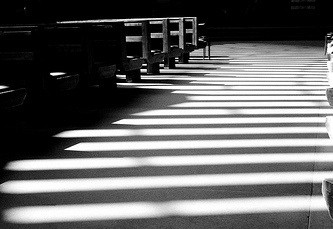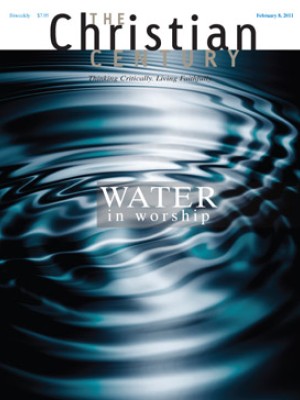Naming the shadows: Truth-telling at funerals
I've seen it often: a beloved church member dies and at the funeral the eulogies go on and on, with the bereaved ones helping to anoint the saint. But then the eulogizers go home, and the bereaved are left behind to find a foothold for grieving this acclaimed someone—and to deal with the reality that the life of the one who died contained shadows as well as sunshine.
We often avoid naming people's shadows, not only in funerals but also in church. We flinch from our sins, our frailties and our messes. We choose the fantasy of eternal sunshine over the richness of naming the truth, in all its fierce and sometimes frightening wildness.
Read our latest issue or browse back issues.
After my mother died, I spoke of her wild spirit as I thanked those who had loved her through difficult final weeks. At times the ferocity that had made her grand also made her a challenge to those who knew her. One courageous respondent spoke up, using humor that wrapped my mother in tenderness, and described her encounters with my mother's shadows. Some of those listening seemed bewildered; they hadn't associated Betty D. King, aka "The Queen," with a shadow side.
I think we should more regularly name shadows, not to run people down but because the truth matters—the truth that none of us are saints.
At funerals we're tempted to avoid all talk of human flaws and frailties. We talk instead about a loved one who lived so well that little forgiveness was needed. Deep down we believe that what counts is keeping up appearances and suppressing shadows. But when we do, we miss the opportunity to know and testify to the blessed freedom of being forgiven. If we really believed that beyond all of the shadows is the embrace of our God, wouldn't we yearn to tell about our loved ones in all their dappled, spotted, shadowed glory?
This was brought home to me by the head nurse at my mother's assisted living unit. With wisdom and grace Valda walked with my mother through her final days. After my mother died, Valda phoned me to share that during those rough days she had been reminded of a haunting line from "Better Than a Hallelujah?" by Sarah Hart and Chapin Hartford: "Beautiful the mess we are."
"I sang that song in church," she told me. "I said, 'Brethren by denomination and Christian by belief we have long suffered in silence when life happens, not wanting to question God's almighty will or ability to know what is best for us. But the Bible is full of individuals who were messes—David, Saul who became Paul, the woman at the well—individuals whom God used in spite of their messy lives. We are all messes in some way. We fail miserably. But God still sees us as beautiful.'"
This is why we must name shadows: by naming them we can turn them from secrets to be hidden into treasures, messes made beautiful.
Of course, life is messier even than ruminations on our messes. Do we, at funerals or in congregational life, really want to put out all the dirty laundry to enable God's power to turn it lovely? I don't believe that we should publicly flagellate ourselves or others. But if we truly believe that shadows can hold treasure as well as curse, then we should be looking for ways to treat ourselves and each other that provide a gracious space for shadows.
This sensitivity may lead us, carefully and in appropriate settings, to celebrate not only how we have managed to be conventionally good but also how God's grace has been present even—and sometimes especially—in our flaws.
I have no formula for doing this, but I can think of one example. Among the worst tragedies I faced as pastor was the death of a young adult from a drug overdose on the very morning she was slated to pick up her mom—who was in a treatment center for mental health and addictions challenges. I had talked with Jessica on the telephone about the trauma of her mom's departure from the home they shared, but I'd never met her. She told me how proud she herself was at having remained clean of drugs for months.
Then I met Jessica. At the funeral home beside a weeping Debbie (on a temporary discharge from the treatment center), I saw how young and lovely Jessica was, and how premature yet final her death was.
At the memorial service we could have celebrated that Jessica was a beautiful woman taken in the prime of life and stopped there. But Debbie wanted the truth named. We agreed that I'd name the elephant: however hard Jessica had tried to stay clean, the drugs had worked even harder. I also reminded everyone how greatly she had been loved—by us, by Debbie, by God, by her many friends.
Afterward, people who'd heard about Jessica told me or her mom stories of their own wounds and addictions. They were haunted by Jessica's fate and the reality that shadows can kill. They also felt deepened trust that amid and through shadows we can be loved—and that Jessica's funeral offered them grace, hope for a decrease in social stigma and inspiration to move toward transformation.
We need the fierce love of Jesus. Aiming to need little in the way of forgiveness is not good enough. Seeking a spotless Christian walk or church is not good enough. Petty perfectionism yields only pinched living.
My own Anabaptist tradition stresses right living as a Jesus passion. But it fades too easily into the quest to be forgiven little.
People yearn for a Christianity that names the truth, that majors in authenticity, that grasps the power of inverting our values so we admire the one forgiven much and worry about the one who's forgiven little. We crave a church that knows how to train us in the way we should go and how to restore us when we depart from it; that calls us to be better than we start out being and to make beautiful the messes we become; that grasps the gift of seeing shadows as sources not so much of shame as of our capacity to love; and that shapes us to hear Jesus say, "Your faith has saved you; go in peace."






